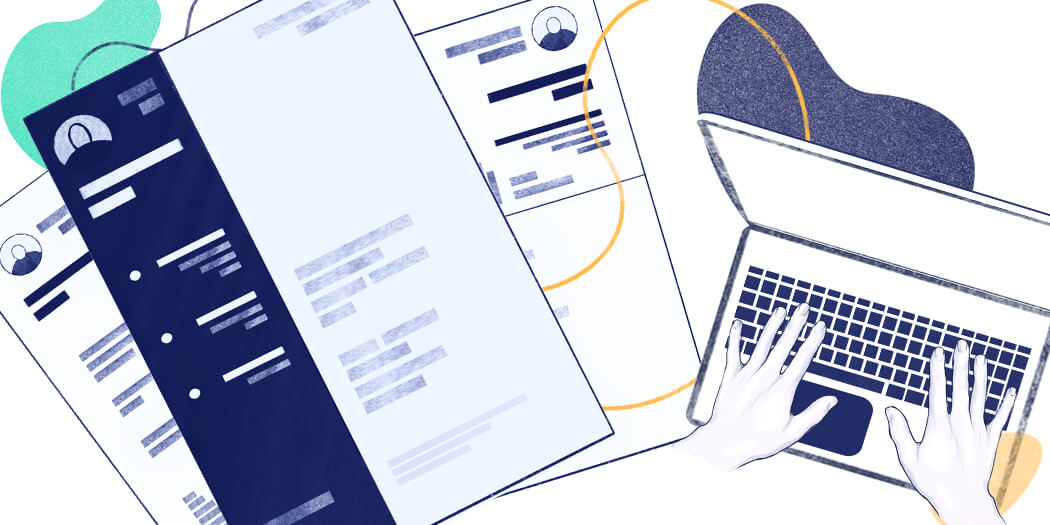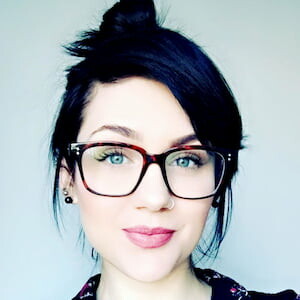
25+ Word Resume Templates (Free & Premium)
Thought that creating a resume in Word format is passé? Not if you use one of the top Word resume templates. See the best free and premium Word resumes.

Mariusz Wawrzyniak
Career Expert

From a part-time warehouse worker to a career expert constantly seeking new challenges, this is the story of my personal and professional transformation.
Have you ever met someone, listened to what their job is, and immediately wanted to know how they got to that point in their life? I know I did on several occasions.
As it turns out, success is a mix of luck, perseverance, and the ability to catch opportunities when they arise. If you want to know how I advanced from a warehouse worker through technology, cryptocurrency, and fashion copywriting to a career expert, read on. This is my career story.
Kids are notorious for changing their future aspirations on a whim, and I was no exception. But in between all these dreams to be a nature documentary filmmaker, firefighter, or scientist, one dream job remained a constant in my mind.
I really wanted to be a published author.
I loved writing (trust me, it’s going to be important later), In fact, I even finished one fantasy book when I was 12, along with dozens of short stories earlier and later in my life. I re-read them recently, and, well, most of them lack a lot of polish and cohesion, but I consider some to be great, and I’m proud of them. However, none of them were ever published anywhere.
So, can you guess what specialization a person who’s an avid reader and writer would choose for their high school classes? That’s right! Biology and chemistry!
Not what you thought, hm? I get it, but I’m sure many of you can relate to being pressured by your parents to get into STEM. I heard “you can’t make money from writing” enough times to believe it. And I actually don’t blame them.
Only about 1–2% of pieces submitted to publishers get published, and the royalties are terrible.
But hey, being a chemist isn’t such a bad idea either (I liked the subject much more than biology). So I burned the midnight oil, learning about oxides, phthalates, radiation, and all other subjects. It was tough, but I enjoyed it.
Since the path to being a scientist was right in front of me, I chose to pursue higher education.
I was one point short of getting into Biomedical Engineering, so I started my freshman year as a student of Material Science. That was one of the toughest years of my life, and I knew I was on my way to dropping out.
Although I enjoyed the subject itself, I felt that something was missing. I decided to look for a similar Major at a different University, and a friend of mine suggested Commodity Science.
And so I switched. It was the best decision I could’ve made. The added economic aspect made everything much more enjoyable for me. I was dead set on receiving my Engineering Degree.
As many people do, I picked up my first job during my studies. It was a simple part-time job at the National Post warehouse, where I distributed packages and letters. I wish I could tell you something about how I approached making my first resume with no experience, but it was one of those jobs where they would hire you even without a resume, so I didn’t make a warehouse resume at all.
So, during these 3.5 years, I didn’t do much other than study and work. I finished my Engineering Degree, but I felt like I wanted to push it further.
Unfortunately, the world had different plans.
The last two semesters of my Master’s Degree happened during the lockdown, and I must admit, I didn’t learn anything during this time.
The worst thing is that I had to rebuild my Master’s thesis completely, as I had no access to the lab. My workload at the warehouse also increased considerably (and payments didn’t), with all the medical supplies we had to distribute, alongside an insane increase in online shopping deliveries.
With no other plan in mind, I decided to change my thesis subject to app development rather than experimenting with the quality of different acrylic paint brands and types. Did I know anything about app development? No, not at all. But I knew there were good tools, mainly app builders, to help me with that.
As much as I would’ve liked to learn to code, I knew I didn’t have the time to do so. So, these builders were my best bet. And together with YouTube tutorials, already existing apps, tons of energy drinks, and my girlfriend’s support I created something that worked. It was a database of paints from several different manufacturers; you could sort them by color, and it had a color picker so if you were looking for a specific shade, it pointed you to the closest one available.
There were a couple of other functionalities available, but that’s not important. What counts is that I successfully defended my Master’s Thesis and became a Master of Engineering in Management and Production Engineering. I was finally ready to hit it big!
And so, it was time to write a resume.
If you were looking for a job around 2020, you know the market was drier than the Sahara desert. I had a less than 1% response rate to my resume, which was insanely discouraging.
But let’s first analyze my resume.
I gained quite a bit of experience working in the warehouse. Not only did I do practical work, but I handled documentation and on-the-floor logistics and led a small group of other workers during critical tasks.
That means I was able to show my skills in leadership, communication abilities, and even some organizational skills. But the problem is, I didn’t do these skills justice. I’ll show you an example of what one of my resume accomplishments looked like and how I would’ve created it currently:
You can see that the second example is much more impactful, and this impact was what I lacked throughout the entire resume. The lack of power words and quantified achievements made my bullet points very weak.
So, a weak and generic resume combined with the driest job market in recent history prevented me from securing any entry-level manufacturing or quality control work. But something else was happening during Covid. While all other industries crumbled, one grew so fast it was hard to believe.
Cryptocurrencies.
Some of you probably nodded with agreement, others likely chuckled, but no matter what your stance on crypto is, it was an emerging market with a lot of money to be made in it. And I don’t mean investing. That was too risky for someone with barely anything in his bank account. What I mean is working for one of the startups.
It's not exactly how I pictured my writing career as a teen, but beggars can’t be choosers. Since I always liked writing, my brother (an SEO master) suggested I learn about SEO and copywriting.
Feeling like it was the finals at a university once again, I got to it, sitting in front of my computer whenever I wasn’t at work, doing certifications on SEMrush, Skillshop, and other websites. All the while I was learning about different coins and tokens, how the blockchain even worked etc., etc.
When I was ready, I wrote a couple of short pieces and pitched them to a potential employer looking for a writer.
The answer was, “It’s still rough but good enough, especially since your education is in economics.” I was thrilled.
I started doing only short-form content, but with each passing week, my writing style and knowledge of the industry grew, so soon, I began optimizing older articles on the company blog, writing 1000+ word articles myself, creating marketing emails, writing copy for landing pages, and even migrating the entire blog to a new content management system.
In other words, in a year, I performed several years of different tasks that would normally not be assigned to a junior copywriter. Did it mean I could put 3+ years of experience on my resume? Unfortunately, no, but it gave me a lot of skills and achievements to work with.
One important thing I did was create a portfolio of my various works, especially those that performed well on Google. This gave my experience some tangible proof, and a portfolio is a must when writing pretty much any writer's resume. I was also writing articles for a fashion company selling high-end cashmere scarves to further my skills.
When my workload diminished due to cryptocurrencies slowing down, I started sending out my resumes. I would again try to get into manufacturing and quality control, but I also sent them for almost any copywriting position I could find.
One of the jobs I applied for was this one. I was certain I wouldn’t get it. I wasn’t a career expert. I didn’t have 2–3 years of relevant experience as a writer, and they offered way too much money to hire someone underqualified. Or so I thought.
But I applied anyway. My job search was a shotgun approach; the only places I didn’t apply for had giant red flags. So, let me tell you what I did well and what I screwed up when applying.
First, the good:
But, there were also some resume mistakes I made:
So, let me give you a big piece of advice—one that you’ve probably heard several times but likely brushed away. Relevance is king.
Some of my achievements from working at a warehouse could prove my transferable skills, like the leadership bullet I showed earlier. But the fact that I can use a scanner, have a lot of stamina, and know how to load and unload a truck are all useless for this position.
Skills like these only take up space and will likely do more harm than good. The same goes for my skills section. Yes, I still know ISO 9001, I can make budget plans, read technical documentation, and even operate an infrared spectrometer. But again, who cares?
Fortunately for me, I did more things good than bad. I showed the company that I’m adaptable and a quick learner and know a lot about SEO (not just through my previous job but also the 10+ certificates I put on my resume).
In addition, my cover letter presented my drive and dedication and was aligned with the company's values. Paired with my big portfolio of various works, I managed to pick their interest.
So, I got a call and, soon after, a task. I researched the company’s writing style and wrote a piece while adhering to the provided guidelines. I passed, and after another 2 rounds of interviews, I got the job.
I guess being a serial career changer can be beneficial.
In my current role as a Career Expert, I have the privilege of helping all kinds of people navigate one of the most challenging phases of their professional lives: the job search. I create guides for writing resumes and cover letters, which are the first big pain points in career journeys.
The big question I often hear is, ”Do these guides even work?” I have even asked myself that question on multiple occasions. But I can proudly say that they do. I’ve seen it myself. I worked directly with several friends who wanted to change their jobs. I optimized their resumes and cover letters and prepared them for job interviews.
All of them got better offers. Some had to choose from multiple companies that wanted them on board.
This is why I put so much effort into each of my articles. I want you to feel I’m right next to you, guiding you through the process—like a pocket edition of a career expert.
Of course, I never rest on my laurels. I’m still learning by reading pieces from more experienced career coaches, materials from the Professional Association of Résumé Writers and Career Coaches, where I’m a member, and by closely following the career industry.
I’m also learning a lot about using AI and recently started a programming boot camp. In addition, I dabbled in 3D modeling, making resin jewelry, and combat sports coaching.
You can make every skill valuable, especially when you don’t know what life will throw your way.
I want to leave you by repeating this piece's title again. There is always time to learn. Don’t stop improving, follow your passions, but don’t be afraid to pivot when opportunities arise.
If you'd like to read some of my favorite pieces, see the list I prepared below:
Thank you for reading this very personal story. If you have any questions about my career journey, struggles, or successes, please ask in the comments below. I’ll happily reply.
At ResumeLab, quality is at the crux of our values, supporting our commitment to delivering top-notch career resources. The editorial team of career experts carefully reviews every article in accordance with editorial guidelines, ensuring the high quality and reliability of our content. We actively conduct original research, shedding light on the job market's intricacies and earning recognition from numerous influential news outlets. Our dedication to delivering expert career advice attracts millions of readers to our blog each year.

Thought that creating a resume in Word format is passé? Not if you use one of the top Word resume templates. See the best free and premium Word resumes.

Mariusz Wawrzyniak
Career Expert

First impressions are the ones that stick, especially at interviews. This guide will teach you how to nail the “Tell me about yourself” interview question, so you look your best.

Aleksandra Makal
Career Expert

Embarking on the job-hunting journey? A great letter of application can be your golden ticket to stand out in the competitive job market. Learn how to write one with our guide.

Mariusz Wawrzyniak
Career Expert